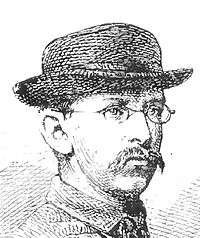Adolf Pansch
Adolf Pansch (2 March 1841, in Eutin – 14 August 1887) was a German anatomist and naturalist.
Adolf Georg Pansch | |
|---|---|
 Adolf Georg Pansch | |
| Born | 2 March 1841 |
| Died | 14 August 1887 (aged 46) |
| Occupation | Naturalist |
| Parent(s) | Johann Heinrich Christian Pansch |
Since 1860 he studied medicine and natural sciences in Berlin and Heidelberg, and from 1862 to 1864 he studied medicine in Berlin and Halle. After graduation, he served as a prosector in the anatomical museum at the University of Kiel, where in 1866 he began work as a lecturer to the faculty of medicine.[1]
In 1869/70 he took part in the Second German North Polar Expedition, about which he published a few works involving the natural history of the Arctic. In 1874 he became an associate professor at the University of Kiel. He died at the age of 46 while on a sailboat excursion in Kieler Förde.[1][2]
His name is associated with "Pansch's flssure", being described as a cerebral fissure running from the lower extremity of the central fissure nearly to the end of the occipital lobe.[3]
Selected works
- "De pyorrhoea alveolari seu gingivitide expulsiva", 1864 (thesis/dissertation, Halle-Wittenberg).
- "De sulcis et gyris in cerebris simiarum et hominum", 1866.
- Einige Bemerkungen über das Klima Pflanzen- und Thierleben auf Ostgrönland, 1871 – Comments on the climate, plant and animal life of eastern Greenland.
- Winter- und Sommerleben auf der deutschen Nordpolarfahrt, 1871 – Winter and summer life of the German North Pole expedition.
- Klima und Pflanzenleben auf Ostgrönland, 1874 – Climate and plant life of eastern Greenland.
- Beiträge zur Morphologie des Grosshirns der Säugethiere, 1879 – Contributions to the morphology of the cerebrum of warm-blooded animals.
- Grundriss der Anatomie des Menschen, 1881 – Outline on the anatomy of humans.
- Anatomische Vorlesungen für Aerzte und ältere Studirende, 1884 – Anatomical lectures for doctors and older students.[4]
References
- Pagel: Biographisches Lexikon hervorragender Ärzte des neunzehnten Jahrhunderts. Berlin, Wien 1901, Sp. 1255-1256 translated biography
- Deutschsprachige Neurologen und Psychiater by Alma Kreuter
- Google Books A Practical Medical Dictionary ...by Thomas Lathrop Stedman
- WorldCat Search publications